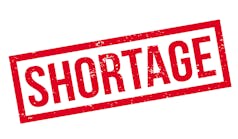Throughout the course of the global COVID-19 pandemic, I have had a considerable amount of time to reflect about my life. Whether it be professional or personal, I have always strived to better myself.
I also find myself analyzing a lot! Professionally, I analyze things like my last Zoom call or WebEx meeting, how I am performing at the task at hand, and preparing future goals for success. Personally, I analyze my mental health by appropriately balancing work, family, friends, fun, and self-care to make sure I am the best husband, father, employee and person I can be. In analyzing this pandemic, I have found an interesting correlation to past pandemics, wars, economic depressions and recessions, etc. The result? Comfort zones! Many people, past or present, were pulled from their comfort zones to a point that was unimaginable.
Before COVID-19 emerged in early 2020, I felt a new project at work was pushing my comfort zone. As a healthcare Supply Chain professional, I have gathered a few things reflecting on the last 15 months and where we are today. I feel in healthcare, we are struggling to keep up with increasing headwinds, the Protecting Access to Medicare Act of 2014 (PAMA) impacting the clinical lab. Additionally, healthcare has seen the highest increase in costs at 200-plus% versus 66% inflation in other industries during the last 20 years, but costs are going up and we cannot get a reliable supply of products critical for patient care. To top it all off, global demand for personal protective equipment (PPE) is higher than I have ever seen. We strive to better ourselves, so why not apply the same principles to work processes? The short answer is, when we learn and take matters into our own hands, we will survive and thrive!
Having been in various professional Supply Chain roles of increasing responsibility inside and outside of healthcare for the past 17 years and being a son and grandson of Supply Chain professionals with careers in Logistics and Procurement, I would say supply chain is in my blood and I love it. I recall my first job was when I was five. My grandpa Steve gave me the responsibility of procuring worms for a fishing trip. These were not just any worms, but “free range” worms. One dollar per dozen was my pay! My grandpa was a strong believer in free range before it was a thing. He said they caught more fish! He did not rely on anyone else; he learned this growing up during the Depression. He always said, “Back when I was your age, if you wanted to eat you couldn’t just fish, you’d have to catch.” So, we went out the next day and we caught. This not only provided dinner for us that night but also his words of wisdom stuck with me.
What is the point about worms and catching fish and how is this analogous to the world of supply chain? To me it is taking control of our destiny with a more hands-on approach to sourcing items we need will drive better both quantitative and qualitative results. The fundamental issue in healthcare is that we seem to be caught in cruise control, which is causing complacency, which leads us to be taken advantage of, and the inevitable outcome is rising prices and concerns about supply access and availability. We have been trained to rely on suppliers who have gotten complacent while enjoying the fruits of rising pricing, and group purchasing organizations (GPOs) that are incentivized by pricing and compliance.
Unfortunately, complacency stifles competition and innovation. Anyone who has studied Economics 101 knows the direct result of limited competition is rising pricing and stagnation.
While I have enjoyed increasing roles of responsibility in my Supply Chain career, my experience in healthcare has only been since 2012. I was talking to some veterans in the industry, discussing PPE shortages, and I was intrigued that they said they were nothing new. They gave examples of AIDS, H1N1, Ebola and now COVID-19 as all sharing the same shortage problem for items like PPE, swabs, tubes, etc.
Several questions came to my mind on why this would be. Why is healthcare not learning from past mistakes on such critical items, as other industries would? Why are they not rolling up their sleeves, putting on their proverbial muck boots and finding their worms?
In my experience, I see that other industries have supply chains that are much more mature because they do a better job of managing risk. Healthcare seems to rely on someone else to fix their problems, whether that be the GPO, distributor, or direct supplier, and affix bandages on an issue until it passes. The bandage approach is precisely why the prospect of future shortages isn’t an “if” proposition, but a resounding “when.”
Next time, I will share 10 points to help you plan for a post-pandemic – and resilient – supply chain.

Eric Jurinic
Eric Jurinic serves as Vice President of Corporate Supply Chain at Accumen Inc. He can be reached at [email protected].





